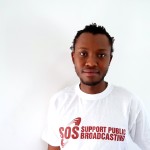Want to know more about our regional networks in Asia, LAC or Africa?
Africa
 Yvonne Oluoch is a developer and technology trainer at YaleCept Consultants for the past three years and the founder of S.K.I.R.T.S (Socially Keen Individuals Redefining Tech Spaces); a collective started last year to build capacity of young women on digital rights, cybersecurity and online privacy. Highlights of her career includes challenging the status quo and disrupting the norm by engaging young women voices in bold conversations on women rights and gender equity. As a global Changemate Fellow in digital rights activism, she has collaborated with women organizations like AMWIK and IWART in Kenya through digital security training forums to further the agenda of tech related violence, women and internet governance through advocacy. She is also a member of women in tech, Africa. Yvonne hopes to bring in novel ideas on digital rights activism and hopes to learn more on internet governance policy advocacy through effective engagement of stakeholders.
Yvonne Oluoch is a developer and technology trainer at YaleCept Consultants for the past three years and the founder of S.K.I.R.T.S (Socially Keen Individuals Redefining Tech Spaces); a collective started last year to build capacity of young women on digital rights, cybersecurity and online privacy. Highlights of her career includes challenging the status quo and disrupting the norm by engaging young women voices in bold conversations on women rights and gender equity. As a global Changemate Fellow in digital rights activism, she has collaborated with women organizations like AMWIK and IWART in Kenya through digital security training forums to further the agenda of tech related violence, women and internet governance through advocacy. She is also a member of women in tech, Africa. Yvonne hopes to bring in novel ideas on digital rights activism and hopes to learn more on internet governance policy advocacy through effective engagement of stakeholders.
Twitter handle: @yokippur
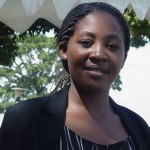 Loyce Kyogabirwe Kabahima: I work with Isis-WICCE, a feminist organization whose mandate is to strengthen women’s leadership and potential in post conflict settings to fully participate in peace building, post conflict recovery and development. I hold a Master’s degree in Development Studies, Bachelor’s degree in Information Studies and other post graduate certificates in gender, human rights and leadership. I have over six years of managing and communicating women’s rights information and managing ICT4D projects. I am in charge of managing and communicating organizations information and knowledge using various communication channels and platforms such as website, social media and print. I have also managed ICT4D projects with grassroots women in Uganda that aimed at combating violence against women and prompting women’s rights using ICTs. The most exciting aspect of this work was seeing rural women embracing technology despite their low levels of education to challenge SGBV their community. They sent out SMS, blogged and documented their stories using ICT tools. Unfortunately this momentum could not be sustained because of limited resources. I am an internet user, but I have not been directly involves in the issues of internet governance and therefore I hope to learn about the trends, debates and discussions taking place around internet governance and women’s rights.
Loyce Kyogabirwe Kabahima: I work with Isis-WICCE, a feminist organization whose mandate is to strengthen women’s leadership and potential in post conflict settings to fully participate in peace building, post conflict recovery and development. I hold a Master’s degree in Development Studies, Bachelor’s degree in Information Studies and other post graduate certificates in gender, human rights and leadership. I have over six years of managing and communicating women’s rights information and managing ICT4D projects. I am in charge of managing and communicating organizations information and knowledge using various communication channels and platforms such as website, social media and print. I have also managed ICT4D projects with grassroots women in Uganda that aimed at combating violence against women and prompting women’s rights using ICTs. The most exciting aspect of this work was seeing rural women embracing technology despite their low levels of education to challenge SGBV their community. They sent out SMS, blogged and documented their stories using ICT tools. Unfortunately this momentum could not be sustained because of limited resources. I am an internet user, but I have not been directly involves in the issues of internet governance and therefore I hope to learn about the trends, debates and discussions taking place around internet governance and women’s rights.
Blog: https://loycek.wordpress.com/
Twitter:@livelyloyce
Sekoetlane Phamodi is a Black feminist activist who has his training in journalism and law. He has been involved in broadcasting and media advocacy for three years, leading public-interest interventions into legislative and policy reforms to broadcasting in South Africa. His approach to broadcasting policy and practice is locating technical issues within a social justice framework that the public can meaningfully engage with. He is most excited about the opportunity to share South African experiences as well learn more about those of the rest of the continent concerning online governance instruments and practice that promote safe and active net citizenship, access to information and freedom of expression.
Sekoetlane is the national coordinator of the SOS Coalition which advocates for public broadcasting as a tool for social change.
Twitter:@MrPhamodi
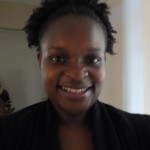 Sylvia Musalagani: I am at Programme officer at Hivos East Africa working on Freedom of expression. I have been working here for the past 3 years. I was recently part of a panel in the Kenyan Internet Governance forum together with very high profile individual s in the sector. My internet freedom program development experience and the challenges of working with different stakeholders. I hope to get more knowledge that will enable me to make more meaningful contributions in internet governance conversations in Africa.
Sylvia Musalagani: I am at Programme officer at Hivos East Africa working on Freedom of expression. I have been working here for the past 3 years. I was recently part of a panel in the Kenyan Internet Governance forum together with very high profile individual s in the sector. My internet freedom program development experience and the challenges of working with different stakeholders. I hope to get more knowledge that will enable me to make more meaningful contributions in internet governance conversations in Africa.
Twitter: @ kanarisylvia
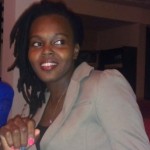 Olga Tsafack is a holder of a Master degree in International Relations specialized in International Communication and Public Action. She works as a freelance digital security trainer and is also a Human rights and women empowerment activist. She has been an ICT4D volunteer for the past 10 years at PROTEGE QV. The most challenging thing I have done up to date has been the ICT initiation training of over 1500 primary school pupils. The most exciting thing being the various trainings I have made to Civil society organization members and Human rights activists on various Digital security tools and secure browsing tips. My contribution to AfriSIG & GIGx 2015 will be in the sharing of my experiences so far in the domain of internet security and access; I however hope to exchange profusely with the different stakeholders and get more knowledge on the current Internet Governance and ICT policy issues in Africa.
Olga Tsafack is a holder of a Master degree in International Relations specialized in International Communication and Public Action. She works as a freelance digital security trainer and is also a Human rights and women empowerment activist. She has been an ICT4D volunteer for the past 10 years at PROTEGE QV. The most challenging thing I have done up to date has been the ICT initiation training of over 1500 primary school pupils. The most exciting thing being the various trainings I have made to Civil society organization members and Human rights activists on various Digital security tools and secure browsing tips. My contribution to AfriSIG & GIGx 2015 will be in the sharing of my experiences so far in the domain of internet security and access; I however hope to exchange profusely with the different stakeholders and get more knowledge on the current Internet Governance and ICT policy issues in Africa.
Twitter: @OlgaTsafack
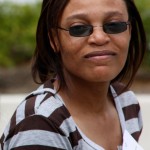 Natasha V. Msonza currently manages operations within Her Zimbabwe, a non-profit women’s rights organization that uses alternative media to bring important commentary to women’s issues and facilitates women’s activism using ICTs and digital tools. Natasha holds an Honours BSc degree in Media and Society studies, and a Masters degree in Human Development. She has a background in communications that spans over eight years. The most exciting and challenging thing she has done in her career has been to take a leap into the unknown; to support a dream that is now a three-year-old child called Her Zimbabwe. In her other life, Natasha is a human rights activist and volunteer digital security trainer, working with a small network of privacy advocates that provides training and technical support to activists and human rights defenders in Zimbabwe. At AfriSig 2015, Natasha hopes to contribute the knowledge she has gained over the years, pertaining to digital security, women’s rights and technology. She hopes to learn more about Internet governance, to be able to effectively facilitate advocacy work pertaining to privacy and closing the destructive Internet gender gap from a more informed perspective.
Natasha V. Msonza currently manages operations within Her Zimbabwe, a non-profit women’s rights organization that uses alternative media to bring important commentary to women’s issues and facilitates women’s activism using ICTs and digital tools. Natasha holds an Honours BSc degree in Media and Society studies, and a Masters degree in Human Development. She has a background in communications that spans over eight years. The most exciting and challenging thing she has done in her career has been to take a leap into the unknown; to support a dream that is now a three-year-old child called Her Zimbabwe. In her other life, Natasha is a human rights activist and volunteer digital security trainer, working with a small network of privacy advocates that provides training and technical support to activists and human rights defenders in Zimbabwe. At AfriSig 2015, Natasha hopes to contribute the knowledge she has gained over the years, pertaining to digital security, women’s rights and technology. She hopes to learn more about Internet governance, to be able to effectively facilitate advocacy work pertaining to privacy and closing the destructive Internet gender gap from a more informed perspective.
Natasha can be followed on twitter: @NatashaMsonza
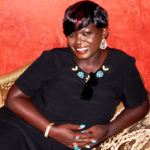 Otieno Careen Atieno: “I tell stories about people, because they matter”. Atieno.
Otieno Careen Atieno: “I tell stories about people, because they matter”. Atieno.
Media Consultant and Vice Chairperson of the International Association of Women in Radio and Television (IAWRT), Kenya Chapter. I have over 12 years experience in the media industry in Kenya. I started off my career as a TV Presenter, then a TV Producer/Director and ventured into consultancy four years ago. Besides producing and directing documentaries for a number of local and international organizations, I am a researcher, media trainer and a writer Some of my short reports are available online here: http://www.metropolistv.nl/en/correspondents/carren-nairobi . I hold a Master of Arts Degree in International Journalism from Cardiff University, UK, a Diploma in Mass Communication from Kenya Institute of Mass Communication among other professional qualifications. Most challenging thing I have ever done in my career is quitting my job to start a consultancy firm. It took me two years to make up my mind and four year on…I still think that was a daring step. One exciting thing that I have done in my career is being nominated for an International Emmy Award for my station’s contribution to Children’s programming. Then winning UNICEF’s coveted world prize for the International Children’s Day of Broadcasting in 2009 was just awesome. IAWRT has been involved in a number of projects on Internet use and safety in Kenya and this will be my chance to share some of our experiences and challenges and I hope to gain knowledge, build my capacity for advocacy on Internet governance and safety, an area we have been actively involved in and share that expertise with our members.
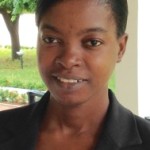 Dora Mawutor is the Programme Officer in charge of Research and Communications at the Media Foundation for West Africa (MFWA) which is based in Accra, Ghana. For almost two years now, she has been also been working as the Coordinator for the organisation’s Internet Freedom Programme which started in Ghana and is gradually extending to other West African countries. Some of the most exciting experiences she has had so far include the setting up of Civil Society Coalitions on Internet Freedom in Ghana and Liberia and the publication of the book: Spotlighting Indecent Election Campaign Language on Radio – an analysis of election campaign language in Ghana’s 2012 general elections. Challenging government policies and practices, on one hand, and seeking to collaborate with them, on the other hand, continues to be a challenge (as it is in most CS work) but finding the right balance has often proved useful.
Dora Mawutor is the Programme Officer in charge of Research and Communications at the Media Foundation for West Africa (MFWA) which is based in Accra, Ghana. For almost two years now, she has been also been working as the Coordinator for the organisation’s Internet Freedom Programme which started in Ghana and is gradually extending to other West African countries. Some of the most exciting experiences she has had so far include the setting up of Civil Society Coalitions on Internet Freedom in Ghana and Liberia and the publication of the book: Spotlighting Indecent Election Campaign Language on Radio – an analysis of election campaign language in Ghana’s 2012 general elections. Challenging government policies and practices, on one hand, and seeking to collaborate with them, on the other hand, continues to be a challenge (as it is in most CS work) but finding the right balance has often proved useful.
“As an alumnus of AfriSIG, I look forward to engaging moreactively and meaningfully contributing to all sessions and bringing to bear experiences and examples from Ghana and the rest of West Africa. I also look forward to networking, upgradingmy knowledge and understanding of trending and emerging IG issues to enable me engage effectively in IG processes in West Africa especially as the MFWA is extending its internet freedom advocacy work in other West African countries.”
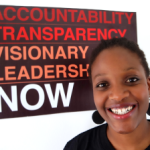 Lweendo Hamukoma is the Campaigns Organiser at SOS Coalition, and she has been part of the organisation since October 2014. Making this shift to the realm of public broadcasting, and the broader area freedom of expression issues has been one of the more challenging things she has undertaken. Her interests have always been more towards sociology, politics and developmental studies but public broadcasting allows for the development of platforms that combine a multiplicity of social rights. Being campaigns organiser has entailed lots of learning. She hopes AfriSIG 2015 will deepen her knowledge of Internet Governance and bring a fresh perspective to the community.
Lweendo Hamukoma is the Campaigns Organiser at SOS Coalition, and she has been part of the organisation since October 2014. Making this shift to the realm of public broadcasting, and the broader area freedom of expression issues has been one of the more challenging things she has undertaken. Her interests have always been more towards sociology, politics and developmental studies but public broadcasting allows for the development of platforms that combine a multiplicity of social rights. Being campaigns organiser has entailed lots of learning. She hopes AfriSIG 2015 will deepen her knowledge of Internet Governance and bring a fresh perspective to the community.
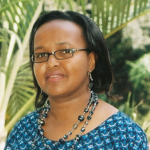 Rachel Kagoiya has been working at FEMNET (the African Women’s Development and Communication Network) for the last nine years as an Information Manager, a position which has enabled her to grow both professionally and personally as an upcoming young woman leader. Largely, her work entails capturing information around women’s rights and development, organizing (including repackaging) and sharing it with a wide spectrum of users via various platforms:- website, blog, facebook, twitter, listserv, documentaries, publications and the Gender & Development Resource Centre. During AfriSIG 2015, she looks forward to learning and broadening my knowledge in internet governance and linkages to women’s rights as well as issues related to access and usage of the internet so as to contribute and engage in ongoing conversations at national and regional fora.
Rachel Kagoiya has been working at FEMNET (the African Women’s Development and Communication Network) for the last nine years as an Information Manager, a position which has enabled her to grow both professionally and personally as an upcoming young woman leader. Largely, her work entails capturing information around women’s rights and development, organizing (including repackaging) and sharing it with a wide spectrum of users via various platforms:- website, blog, facebook, twitter, listserv, documentaries, publications and the Gender & Development Resource Centre. During AfriSIG 2015, she looks forward to learning and broadening my knowledge in internet governance and linkages to women’s rights as well as issues related to access and usage of the internet so as to contribute and engage in ongoing conversations at national and regional fora.
Twitter: @rkagoiy
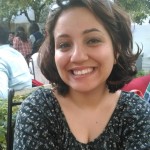 Senda Ben Jebara is the general secretary of Chouf, a tunisin feminist organization working on gender equality and women sexual and bodily rights. The Chouf experience has been itself, a challenge for her. Being a full time student and a member of a political party, as well as a board member of the organization has proven to be quite a challenge. The most exciting thing she got to do with Chouf was the preparation of The Chouftouhonna festival, which is an international feminist festival. Participating in the AfriSIG and GIGx 2015 will allow me to share my experience with other participants and help me strengthen my knowledge on internet governance issues.
Senda Ben Jebara is the general secretary of Chouf, a tunisin feminist organization working on gender equality and women sexual and bodily rights. The Chouf experience has been itself, a challenge for her. Being a full time student and a member of a political party, as well as a board member of the organization has proven to be quite a challenge. The most exciting thing she got to do with Chouf was the preparation of The Chouftouhonna festival, which is an international feminist festival. Participating in the AfriSIG and GIGx 2015 will allow me to share my experience with other participants and help me strengthen my knowledge on internet governance issues.
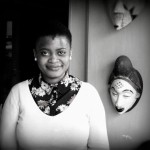 Chenai Chair is a researcher with Research ICT Africa. She holds an MSocSci specialising in Global Studies, and a BSocSci in Gender Studies and Industrial Relations from the University of Cape Town. Her areas of specialization include conducting qualitative studies with a focus on gender, youth and the informal sector as well as tacking pricing patterns in the supply side of telecommunications in Africa. The most exciting and challenging thing in her career is keeping up with tech trends; their impact on socioeconomic development and accompanying policy and regulatory issues. With her participation in AFRISIG and the IGF, she hopes to bring to the fore the importance of African based evidence for determining the way forward in internet governance. She hopes to take away an understanding of gender and internet governance rights issues and a collaborative network.
Chenai Chair is a researcher with Research ICT Africa. She holds an MSocSci specialising in Global Studies, and a BSocSci in Gender Studies and Industrial Relations from the University of Cape Town. Her areas of specialization include conducting qualitative studies with a focus on gender, youth and the informal sector as well as tacking pricing patterns in the supply side of telecommunications in Africa. The most exciting and challenging thing in her career is keeping up with tech trends; their impact on socioeconomic development and accompanying policy and regulatory issues. With her participation in AFRISIG and the IGF, she hopes to bring to the fore the importance of African based evidence for determining the way forward in internet governance. She hopes to take away an understanding of gender and internet governance rights issues and a collaborative network.
Asia
 Dhyta Caturani is a feminist activist working on issues related to human rights and social justice with focus on sexuality, women’s rights, and violence against women. As a Project Coordinator at EngageMedia, she focuses on the use of alternative media and technology within social movements to create positive and ethical change. She has co-founded a number of collectives for women, video activists, and LGBT communities, and is currently organising a collective that tackles the issues of gender, sexuality and technology.
Dhyta Caturani is a feminist activist working on issues related to human rights and social justice with focus on sexuality, women’s rights, and violence against women. As a Project Coordinator at EngageMedia, she focuses on the use of alternative media and technology within social movements to create positive and ethical change. She has co-founded a number of collectives for women, video activists, and LGBT communities, and is currently organising a collective that tackles the issues of gender, sexuality and technology.
Farhana Akter is a veteran development activist with more than ten years of practical experience in the non-profit sector of Bangladesh. She works as an Associate Programme Coordinator of VOICE (www.voicebd.org) – a research and advocacy organization of Bangladesh. She plays a leading role in coordinating and implementing research and policy advocacy programs of the organization. Internet rights, communication surveillance, privacy rights, ICT4D, freedom of expression, open data, open government, post- 2015, aid effectiveness and human rights are her primary areas of expertise. Farhana has accomplished her Bachelors (Honors) and Masters in English. She is currently finalizing a thesis titled “Communication Surveillance Threatens Privacy and Human Rights – A Case of Bangladesh” as part of her ‘Master of Arts in Inter-Asia NGO Studies (MAINS)’ program at the SungKongHoe University, Seoul, South Korea. Additionally, Farhana is a coordinating member of ‘World March of Women’, an International women’s network.
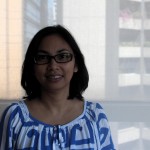 Hendriati Trianita, or Nita as her colleagues and friends call her, is a Program and Operations Manager in EngageMedia, a media and technology organization. Nita has more than 15 years experience working with national and international NGOs in Indonesia, doing advocacy, research, and management work. During her involvement in Indonesian social movements, she handled issues including gender, human rights, interfaith dialogue, environment, and community empowerment. Her academic background in communication and media studies led her to work in participatory video projects on various social issues. Her recent work with EngageMedia connects her to the issues of internet rights in relation to freedom of expression.
Hendriati Trianita, or Nita as her colleagues and friends call her, is a Program and Operations Manager in EngageMedia, a media and technology organization. Nita has more than 15 years experience working with national and international NGOs in Indonesia, doing advocacy, research, and management work. During her involvement in Indonesian social movements, she handled issues including gender, human rights, interfaith dialogue, environment, and community empowerment. Her academic background in communication and media studies led her to work in participatory video projects on various social issues. Her recent work with EngageMedia connects her to the issues of internet rights in relation to freedom of expression.
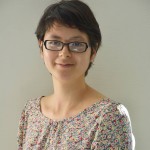 Pinda Phisitbutra is a digital rights officer at the Foundation for Internet and Civic Culture (known as Thai Netizen Network), Thailand. She considers herself an internet enthusiast who believes in the power of internet and technology: that it can help improve the living condition of people around the world. In her free time, she likes reading, writing and swimming.
Pinda Phisitbutra is a digital rights officer at the Foundation for Internet and Civic Culture (known as Thai Netizen Network), Thailand. She considers herself an internet enthusiast who believes in the power of internet and technology: that it can help improve the living condition of people around the world. In her free time, she likes reading, writing and swimming.
 Sajia Afreen Smita is working as a learning facilitator at the world’s largest non-government organization, BRAC with experience in research on ‘ICT integrated education’. She also worked as a researcher at Japan International Cooperation Agency (JICA). Currently, she is working as the Coordinator of Take Back the Tech! Bangladesh and also as a gender focal point at Bangladesh Open Source Network (BdOSN). She specialized in ‘Science, Mathematics and Technology Education’ from Institute of Education and Research (IER), University of Dhaka. In her student life, she worked as a Deputy Team Leader of IER YES (Youth Engagement Support) group under Transparency International Bangladesh (TIB).
Sajia Afreen Smita is working as a learning facilitator at the world’s largest non-government organization, BRAC with experience in research on ‘ICT integrated education’. She also worked as a researcher at Japan International Cooperation Agency (JICA). Currently, she is working as the Coordinator of Take Back the Tech! Bangladesh and also as a gender focal point at Bangladesh Open Source Network (BdOSN). She specialized in ‘Science, Mathematics and Technology Education’ from Institute of Education and Research (IER), University of Dhaka. In her student life, she worked as a Deputy Team Leader of IER YES (Youth Engagement Support) group under Transparency International Bangladesh (TIB).
 Noemi Lardizabal-Dado: Editor, BlogWatch Citizen Media. Mom blogger, making a difference in the lives of her kids by advocating social change for social good. http://blogwatch.ph/
Noemi Lardizabal-Dado: Editor, BlogWatch Citizen Media. Mom blogger, making a difference in the lives of her kids by advocating social change for social good. http://blogwatch.ph/
 Christina Lopez: Christina Lopez is a registered and licensed Social Worker in the Philippines. She has been practicing Social Work with women, children and migrant sectors since 2007.She joined the Foundation for Media Alternative (FMA) in January 2015 as a Gender and ICT Program Assistant. Her interest in technology-related issues and challenges started when online violence occurred and became the social issues towards women and young children.
Christina Lopez: Christina Lopez is a registered and licensed Social Worker in the Philippines. She has been practicing Social Work with women, children and migrant sectors since 2007.She joined the Foundation for Media Alternative (FMA) in January 2015 as a Gender and ICT Program Assistant. Her interest in technology-related issues and challenges started when online violence occurred and became the social issues towards women and young children.
 Hazel Divinagracia: Hazel works in the Center for Migrant Advocacy Philippines Inc., and her areas of competency involve disaster management, advocacy for women’s and children rights, computer and IT technologies.
Hazel Divinagracia: Hazel works in the Center for Migrant Advocacy Philippines Inc., and her areas of competency involve disaster management, advocacy for women’s and children rights, computer and IT technologies.
LAC
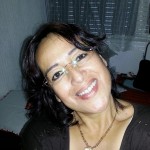 Adela Muñiz Guadarrama tiene una experiencia de 20 años como activista del movimiento feminista mexicano y está especializada en relaciones políticas y alianzas estratégicas con organizaciones de la sociedad civil y tomadores/as de decisiones así como en la utilización de las redes sociales como herramientas para la construcción de ciudadanía. Su trayectoria se destaca por los trabajos de cabildeo y diseño de estrategias de incidencia política en temas de género y derechos de las mujeres. Ha dirigido campañas locales y nacionales enfocadas en derechos de las mujeres y ha conducido programas radiofónicos, revistas así como talleres y conferencias en temas electorales y de género. Es también fundadora de organizaciones y redes de la sociedad civil, y ha sido becaria de diversas agencias de cooperación internacional. Actualmente es directora de Política y Comunicación Estratégica en Equidad de Género, Ciudadanía, Trabajo y Familia, AC.
Adela Muñiz Guadarrama tiene una experiencia de 20 años como activista del movimiento feminista mexicano y está especializada en relaciones políticas y alianzas estratégicas con organizaciones de la sociedad civil y tomadores/as de decisiones así como en la utilización de las redes sociales como herramientas para la construcción de ciudadanía. Su trayectoria se destaca por los trabajos de cabildeo y diseño de estrategias de incidencia política en temas de género y derechos de las mujeres. Ha dirigido campañas locales y nacionales enfocadas en derechos de las mujeres y ha conducido programas radiofónicos, revistas así como talleres y conferencias en temas electorales y de género. Es también fundadora de organizaciones y redes de la sociedad civil, y ha sido becaria de diversas agencias de cooperación internacional. Actualmente es directora de Política y Comunicación Estratégica en Equidad de Género, Ciudadanía, Trabajo y Familia, AC.
 Florencia Goldsman es licenciada en Comunicación (UBA), trabaja como periodista cultural, media-activista con enfoque de género en medios digitales y analógicos desde hace más de quince años redactando artículos, reseñas, noticias, reportajes, entrevistas e incursionando en formatos multimedia como radio y TV en línea. Hoy es parte del grupo de investigación en ciberculturas y género en la Universidad Federal de Bahia, Brasil. Comenzó en 2009 a colaborar en campañas de uso de herramientas digitales con fines creativos vinculados con el ciberactivismo enfocadas en proteger los datos de las mujeres y enseñarles a usar herramientas digitales. Desde hace más de cuatro años escribe artículos periodísticos sobre TIC con perspectiva de género e igualdad, fortalecimiento y divulgación de los derechos de las mujeres.
Florencia Goldsman es licenciada en Comunicación (UBA), trabaja como periodista cultural, media-activista con enfoque de género en medios digitales y analógicos desde hace más de quince años redactando artículos, reseñas, noticias, reportajes, entrevistas e incursionando en formatos multimedia como radio y TV en línea. Hoy es parte del grupo de investigación en ciberculturas y género en la Universidad Federal de Bahia, Brasil. Comenzó en 2009 a colaborar en campañas de uso de herramientas digitales con fines creativos vinculados con el ciberactivismo enfocadas en proteger los datos de las mujeres y enseñarles a usar herramientas digitales. Desde hace más de cuatro años escribe artículos periodísticos sobre TIC con perspectiva de género e igualdad, fortalecimiento y divulgación de los derechos de las mujeres.
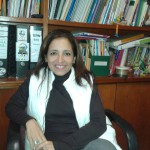 Mirian Candia Sánchez es integrante de la Asociación Trinidad y de la Coordinación de Mujeres del Paraguay (CMP). Comunicadora social y radialista, docente universitaria, ha trabajado en el ámbito de la democratización de las comunicaciones en el país y América Latina. Ha dirigido diversas tareas para el empoderamiento de las mujeres en las organizaciones y medios de comunicación, diseñado y coordinado campañas en comunicación y género y realizado consultorías a instituciones públicas, privadas y organismos nacionales e internacionales. Fundadora de Radio Trinidad, luego Radio Vida que opera en la 90.1 FM en Asunción, ha desarrollado diversos talleres en el país y en la región sobre comunicación, TIC, género, salud sexual y reproductiva, entre otros. Es egresada en comunicación de la Universidad Nacional de Asunción, con especialización en didáctica universitaria y en proceso de elaboración de tesis de Magister en Comunicación. Realizó varios cursos de especialización en el exterior.
Mirian Candia Sánchez es integrante de la Asociación Trinidad y de la Coordinación de Mujeres del Paraguay (CMP). Comunicadora social y radialista, docente universitaria, ha trabajado en el ámbito de la democratización de las comunicaciones en el país y América Latina. Ha dirigido diversas tareas para el empoderamiento de las mujeres en las organizaciones y medios de comunicación, diseñado y coordinado campañas en comunicación y género y realizado consultorías a instituciones públicas, privadas y organismos nacionales e internacionales. Fundadora de Radio Trinidad, luego Radio Vida que opera en la 90.1 FM en Asunción, ha desarrollado diversos talleres en el país y en la región sobre comunicación, TIC, género, salud sexual y reproductiva, entre otros. Es egresada en comunicación de la Universidad Nacional de Asunción, con especialización en didáctica universitaria y en proceso de elaboración de tesis de Magister en Comunicación. Realizó varios cursos de especialización en el exterior.
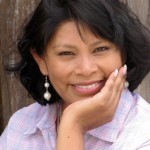 Soledad Venegas Nava tiene 45 años y cuenta con una maestría en desarrollo regional y tecnológico, maestría en docencia, y es informática de profesión. Es dueña y socia de negocio Studio Mantis, una empresa enfocada a dar soluciones en tecnología TI a empresas pyme en Oaxaca, así como organizaciones civiles y personas del ámbito educativo. Mujer de convicción, enfocada a estudios sociales, interesada por el empoderamiento de las mujeres a través de las TIC. Mujer sensible al género y en lucha por la autonomía de las mujeres principalmente indígenas de Oaxaca que permita el desarrollo personal y social, por la idea utópica de una visión donde exista un mundo sin violencia de género, mujeres agentes de cambio y fortalecidas redes de apoyo. Bloguera entusiasta por aprender y compartir conocimientos, con más mujeres en el mundo, escribe en diversos blogs como oaxacamujereslideres.blogspot.mx y solteje.blogspot.mx.
Soledad Venegas Nava tiene 45 años y cuenta con una maestría en desarrollo regional y tecnológico, maestría en docencia, y es informática de profesión. Es dueña y socia de negocio Studio Mantis, una empresa enfocada a dar soluciones en tecnología TI a empresas pyme en Oaxaca, así como organizaciones civiles y personas del ámbito educativo. Mujer de convicción, enfocada a estudios sociales, interesada por el empoderamiento de las mujeres a través de las TIC. Mujer sensible al género y en lucha por la autonomía de las mujeres principalmente indígenas de Oaxaca que permita el desarrollo personal y social, por la idea utópica de una visión donde exista un mundo sin violencia de género, mujeres agentes de cambio y fortalecidas redes de apoyo. Bloguera entusiasta por aprender y compartir conocimientos, con más mujeres en el mundo, escribe en diversos blogs como oaxacamujereslideres.blogspot.mx y solteje.blogspot.mx.
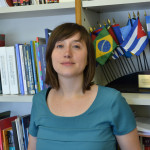 Verónica Ferrari es investigadora en la Iniciativa por la Libertad de Expresión en Internet (iLEI) del Centro de Estudios en Libertad de Expresión y Acceso a la Información (CELE). Allí en el CELE, Verónica también coordina la comunicación del centro. Es licenciada en Ciencias de la Comunicación de la Universidad de Buenos Aires y, antes, se desempeñó como coordinadora del área de comunicación y prensa en organizaciones no gubernamentales vinculadas a derechos humanos.
Verónica Ferrari es investigadora en la Iniciativa por la Libertad de Expresión en Internet (iLEI) del Centro de Estudios en Libertad de Expresión y Acceso a la Información (CELE). Allí en el CELE, Verónica también coordina la comunicación del centro. Es licenciada en Ciencias de la Comunicación de la Universidad de Buenos Aires y, antes, se desempeñó como coordinadora del área de comunicación y prensa en organizaciones no gubernamentales vinculadas a derechos humanos.
